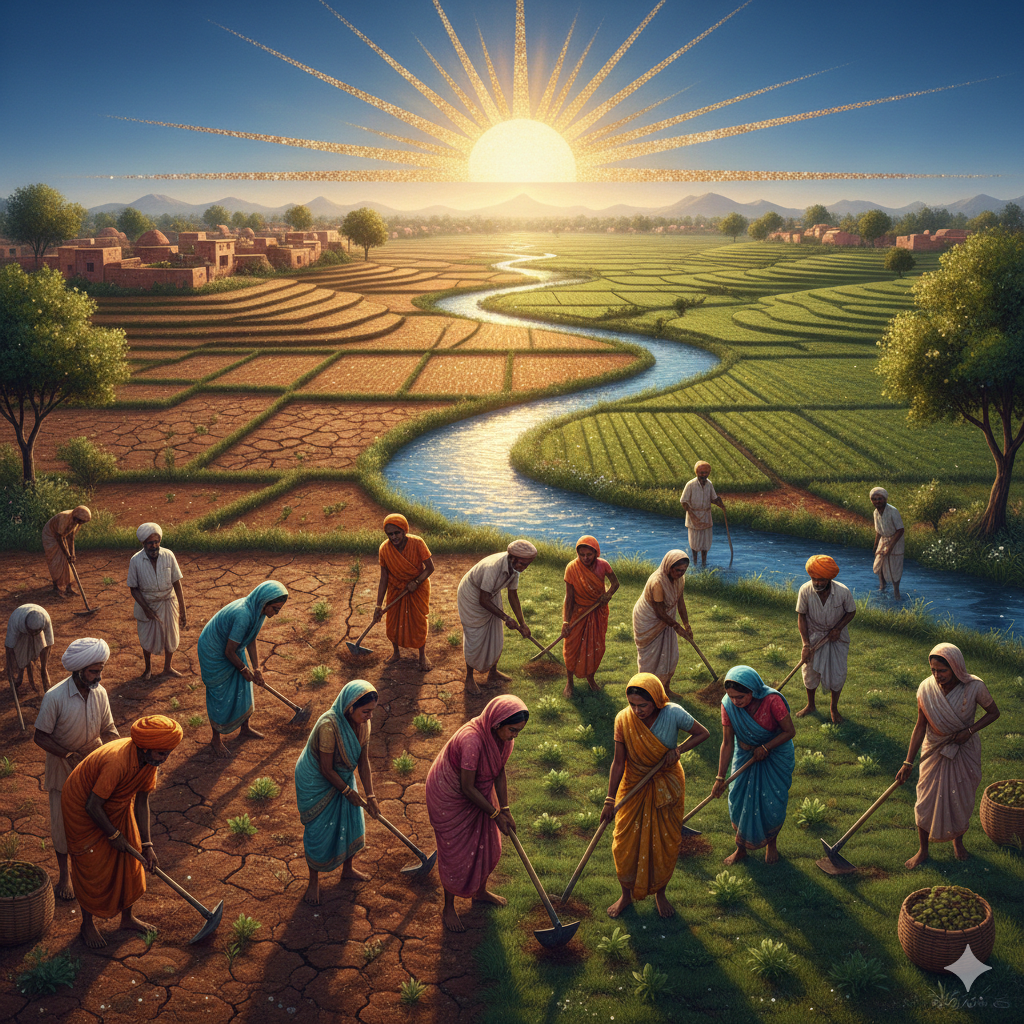Introduction
Mahatma Gandhi, the Father of the Nation, occupies a unique position in the history of India and the world. His philosophy, deeply rooted in truth (Satya), non-violence (Ahimsa), simplicity, and moral strength, transformed not only India’s freedom struggle but also inspired global movements for peace and justice. Gandhi’s thoughts were not confined to his own era; they were universal, timeless, and capable of guiding humanity through moral, social, political, and environmental crises.
In the 21st century—marked by rapid globalization, technological advancement, social inequalities, and climate change—the Gandhian philosophy provides a moral compass. His vision of a just society, economic self-reliance, ethical governance, and sustainable development continues to hold immense relevance.
1. Gandhian Philosophy: An Overview
Gandhian thought is not confined to a single ideology but encompasses a wide spectrum of moral, spiritual, political, and economic principles. Some of its major pillars include:
- Truth (Satya) and Non-violence (Ahimsa) – Gandhi considered truth the ultimate reality and non-violence the means to attain it.
- Sarvodaya (Welfare of All) – He believed in a society where the welfare of every individual, especially the weakest, is ensured.
- Swaraj (Self-Rule) – For Gandhi, Swaraj was not only political independence but also self-control and self-reliance at personal and community levels.
- Trusteeship – Economic resources, Gandhi believed, should be held as a trust for the welfare of all.
- Simplicity and Self-reliance – Gandhi emphasized simple living, moral strength, and local production through khadi and village industries.
- Harmony between Religion and Politics – Gandhi viewed politics as a moral endeavor guided by ethical and spiritual values.
2. Relevance of Gandhian Thought in Contemporary Politics
(a) Moral Politics and Ethical Leadership
In an age when politics is often associated with corruption, power struggles, and opportunism, Gandhi’s idea of “politics without morality” being a sin remains highly relevant. His insistence that political life must be guided by ethics and service can serve as a corrective to modern democratic systems that often prioritize vote-bank politics over genuine public welfare.
(b) Non-violence in Political Conflicts
The Gandhian method of non-violent protest or Satyagraha offers an enduring model for peaceful resistance. Across the world, movements like Martin Luther King Jr.’s Civil Rights Movement, Nelson Mandela’s anti-apartheid struggle, and recent global protests have drawn inspiration from Gandhian principles. In modern democracies, where social polarization and violent agitation are rising, Gandhi’s methods encourage dialogue, tolerance, and reconciliation.
(c) Decentralized Governance
Gandhi’s idea of Gram Swaraj—empowered self-governing villages—aligns closely with India’s Panchayati Raj system. In today’s governance model, where local participation is key to democratic success, Gandhi’s stress on decentralized power remains profoundly significant.
3. Gandhian Economics and the Modern World
Gandhi’s economic ideas, often termed “Gandhian Economics” or “Economy of Permanence”, were based on moral values rather than material greed.
(a) Trusteeship and Corporate Responsibility
In Gandhi’s view, wealth was not to be hoarded but used for the welfare of society. His Theory of Trusteeship is reflected today in the concept of Corporate Social Responsibility (CSR), where corporations are expected to contribute to social welfare, environmental sustainability, and ethical governance.
(b) Sustainable and Inclusive Development
Gandhi’s emphasis on small-scale industries, local production, and respect for nature anticipates the modern ideals of sustainability and environmental ethics. His principle of “production by the masses, not mass production” provides a valuable framework in the context of unemployment, ecological imbalance, and economic inequality.
(c) Simplicity and Anti-consumerism
In a world driven by consumerism, Gandhi’s lifestyle of minimalism teaches restraint and balance. His vision encourages the pursuit of needs over greed and reminds humanity of the importance of harmony with nature.
4. Gandhi and Social Harmony
(a) Communal Unity
Gandhi devoted his life to bridging the divide between Hindus, Muslims, Sikhs, and Christians. In today’s world, where communal tensions and identity politics are on the rise, Gandhi’s message of “unity in diversity” and “Sarva Dharma Sambhava” (equal respect for all religions) provides the foundation for peaceful coexistence.
(b) Upliftment of the Marginalized
Gandhi called the Dalits “Harijans”—children of God—and fought tirelessly for their dignity and social inclusion. His ideas on equality, dignity of labour, and social reform continue to resonate in contemporary discussions on affirmative action, social justice, and human rights.
(c) Empowerment of Women
Gandhi was among the first Indian leaders to advocate for women’s empowerment. He believed that women’s strength lay in moral and spiritual power, not subservience. Today, in the era of gender equality and empowerment, Gandhi’s recognition of women as equal participants in nation-building remains visionary.
5. Gandhi’s Relevance in Education and Youth Development
Gandhi’s Nai Talim or Basic Education emphasized the harmonious development of hand, heart, and head. It sought to create self-reliant, morally upright, and socially responsible citizens.
(a) Skill-based and Value Education
Modern education often emphasizes competition over character. Gandhi’s focus on value-based education, community service, and manual labour can help reform systems to produce not just professionals, but responsible citizens.
(b) Youth and Moral Leadership
Gandhi believed that the youth of the country must lead a life of discipline and service. In an era where youth are confronted by materialism and moral confusion, Gandhian ideals of self-restraint, social commitment, and compassion serve as guiding principles.
6. Gandhi and Global Peace
(a) Non-violence as a Global Philosophy
In a world plagued by wars, terrorism, and ideological extremism, Gandhi’s doctrine of Ahimsa stands as a timeless message for peace and humanity. Organizations like the United Nations often invoke Gandhian values for peacekeeping and humanitarian missions.
(b) Dialogue over Conflict
Gandhi’s emphasis on negotiation and mutual respect is particularly relevant in resolving modern geopolitical disputes. His philosophy of non-violent communication offers tools for conflict resolution and international diplomacy.
(c) Global Environmental Ethics
Gandhi’s famous statement, “Earth provides enough to satisfy every man’s need, but not every man’s greed,” encapsulates the essence of environmental sustainability. His life reminds humanity that moral responsibility must accompany material progress.
7. Gandhian Ideals and Environmental Sustainability
In the age of climate change and ecological crisis, Gandhi’s thoughts are more significant than ever.
- Sustainable Living: Gandhi promoted simple living and limited consumption, advocating harmony between humans and nature.
- Village-based Economy: His stress on local production minimizes carbon footprints and supports eco-friendly practices.
- Ethical Use of Resources: Gandhi’s trusteeship principle suggests that natural resources should be used responsibly for collective welfare.
- Modern Relevance: Concepts like zero waste, organic farming, and local self-sufficiency reflect the Gandhian approach to ecological balance.
Gandhi was, in many ways, one of the first environmental thinkers who understood the moral and ecological dangers of industrial excess.
8. Gandhi’s Ideas and Global Movements
Gandhi’s influence extended far beyond India’s borders. His philosophy became a universal tool for liberation and peace:
- Martin Luther King Jr. in the United States used Gandhian non-violence in the Civil Rights Movement.
- Nelson Mandela adopted Gandhian strategies during South Africa’s anti-apartheid struggle.
- Aung San Suu Kyi and other modern leaders cited Gandhi as a source of moral courage.
- Environmental movements like Chipko and Narmada Bachao Andolan in India drew inspiration from his methods of peaceful resistance.
This global acceptance reinforces the universality of Gandhi’s message — transcending time, geography, and culture.
9. Gandhi’s Vision of a Just and Compassionate Society
Gandhi’s dream of Ram Rajya was not a theocratic ideal but a symbol of moral governance and social justice. In today’s world—rife with inequality, injustice, and political polarization—his ideas of compassion, equality, and ethical politics are crucial for building a humane global order.
- Equality and Justice: Gandhi’s belief in moral equality aligns with modern human rights principles.
- Democracy with Values: His insistence that true democracy requires moral citizens remains critical for sustainable governance.
- Spiritual Humanism: Gandhi’s spirituality emphasized love, truth, and the unity of mankind—a powerful antidote to modern materialism.
10. Challenges in Applying Gandhian Thought Today
While Gandhian ideals are universally admired, their application faces challenges:
- Industrial and Technological Pressure: Modern economies driven by mass production and consumption conflict with Gandhi’s simplicity.
- Global Capitalism: Economic globalization undermines self-reliance and local economies.
- Political Opportunism: The ethical purity Gandhi demanded is rare in contemporary politics.
- Cultural Shifts: The modern lifestyle prioritizes material comfort over moral discipline.
Yet, despite these challenges, Gandhi’s thought continues to inspire policymakers, activists, and scholars who seek alternatives to violence, inequality, and ecological destruction.
11. Gandhian Thought in Indian Policy and Governance
Several Indian government initiatives reflect Gandhian influence:
- Swachh Bharat Mission: Inspired by Gandhi’s emphasis on cleanliness and sanitation.
- Make in India & Atmanirbhar Bharat: Echo his call for self-reliance and indigenous production.
- Panchayati Raj Institutions: Reflect Gandhi’s idea of village self-rule.
- Rural Development Programs: Aim to achieve Sarvodaya or the welfare of all.
Even today, Gandhian philosophy serves as the moral foundation of Indian democracy, guiding governance with values of equality, justice, and inclusivity.
12. Gandhi’s Message for the Future
Gandhi’s vision was not only about India’s independence but about building a new world order based on peace, cooperation, and morality. His teachings emphasize that real freedom lies in self-control, not in the absence of restraint.
In the face of modern crises—wars, ecological disasters, inequality, and moral decay—his message reminds humanity of the need to rebuild societies on ethical foundations.
Conclusion
The thoughts of Mahatma Gandhi remain a beacon of light in a world clouded by conflict, greed, and moral uncertainty. His principles of truth, non-violence, self-reliance, equality, and moral integrity transcend the boundaries of time and geography. Gandhi’s relevance in the 21st century is not a matter of reverence but of necessity.
Whether it is the quest for world peace, sustainable development, social justice, or ethical governance—Gandhi’s philosophy continues to guide the conscience of humanity. His life reminds us that change begins within, and that a compassionate, moral, and peaceful world is not an ideal but a responsibility.
As Gandhi once said, “Be the change you wish to see in the world.” In that message lies the eternal relevance of his thought — a vision for humanity’s progress built upon truth, love, and non-violence.




